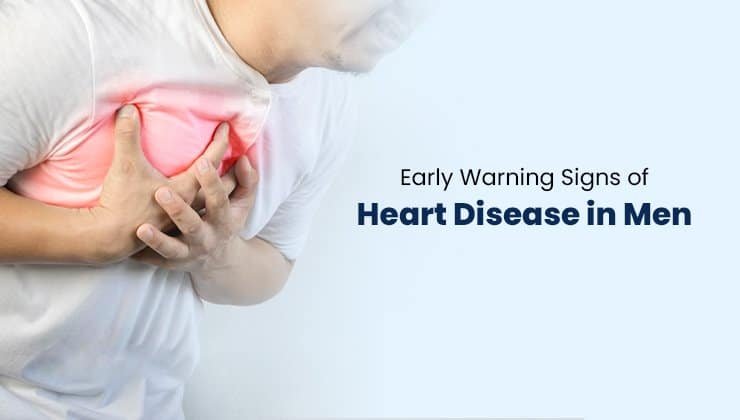Heart disease remains the leading cause of death among men globally. The body may give subtle signs long before a heart disease occurs, which are often overlooked. Understanding and knowing these signs in men may help them reduce the risk of developing serious complications.
Read on to explore some of the early warning signs and symptoms of heart disease in men!
Understanding Heart Diseases
Heart diseases are a group of conditions that affect the heart and blood vessels. It includes coronary artery disease, arrhythmias, heart failure, angina, and other heart-related irregularities, infections, and birth abnormalities.
The different signs and symptoms of heart disease include chest pain, dizziness, and shortness of breath.
Why Men Are At Higher Risk For Heart Disease?
Men are at a higher risk for heart disease due to a combination of biological, lifestyle, and behavioural factors. The different factors that make men more vulnerable to heart disease include
- Hormonal differences: Estrogen, predominant in women, offers some protective effects on the heart, whereas men lack this protective effect and so, are more susceptible to developing heart conditions
- Lifestyle factors: Different lifestyle factors, including increased smoking, unhealthy diets, and sedentary lifestyle habits, may contribute to men’s increased vulnerability to developing heart disease.
- Blood pressure and hypertension: Men are more likely to develop high blood pressure in life than women, which may increase the strain on the heart and contribute to heart diseases.
- High stress: Men are more likely to have jobs that have high stress, which is another risk factor for developing heart disease.
- Genetic factors: Men tend to accumulate more visceral fat around the organs, which is harmful than subcutaneous fat, which in turn increases the risk of developing hypertension, diabetes, and other conditions leading to heart disease.
Early Signs Of Heart Disease In Men
Below are early warning signs of heart disease that men should not ignore:
- Chest Discomfort
Chest discomfort is a common sign of heart disease among men. Individuals may feel pain, pressure or tightness in the chest during physical activity or stress when they have a blocked artery.
The severity of the chest pain may vary between different people, and the pain may last longer than a few minutes. This discomfort may radiate to the arms, back, neck or jaw.
- Physical Exhaustion
Unexplained fatigue or weakness during routine activities may be a sign of heart problems among men. If the individual finds doing everyday tasks more tiring than usual, it is essential to consult a healthcare provider.
- Erectile Dysfunction
Erectile dysfunction may be an early sign of heart disease. It often results from reduced blood flow due to narrowed arteries.
However, erectile dysfunction may not always indicate an underlying heart problem. But, it is preferable to be screened for heart diseases if you face erectile dysfunction.
- Sweating
Excessive sweating without physical exertion, particularly cold sweats, may indicate an early sign of a heart attack in men.
Pumping blood through clogged arteries requires more energy, and the body sweats more to keep the body temperature down. So, experiencing cold sweats or clammy skin may be an early warning sign of a heart problem.
- Snoring
It is normal to snore while you are sleeping. But, sometimes unusually loud snoring that sounds like gasping or choking may be a sign of sleep apnea, and it puts stress on your heart. A healthcare professional may conduct a sleep study to check if snoring is related to heart disease.
- Cough that won’t quit
If you have heart disease or are at risk of developing heart disease, pay attention to a persistent cough that produces white or pink mucus, as it may be a sign of heart failure. It happens when the heart can’t keep up with the body’s demands and causes the blood to leak back into the lungs.
- Leg, Arms, or Jaw pain or swelling
Heart-related pain is not always localised to the chest. If you notice pain or swelling in the legs, arms, or jaw, it could suggest that blood is not able to flow freely, and it may be related to heart problems.
- Irregular heartbeats or heart arrhythmia
It can be normal for the heart to race when you are nervous or excited. However, palpitations, fluttering sensations, or irregular heartbeats that are persistent or accompanied by chest pain, pressure, dizziness, or shortness of breath may indicate arrhythmias that may lead to more severe heart conditions if left untreated.
What Are The Main Risk Factors For Heart Disease In Men?
The different risk factors for heart disease in men include
- High blood pressure
- High cholesterol levels
- Diabetes
- Smoking
- Obesity
- Family history of heart disease
- Sedentary lifestyle
- Excessive alcohol consumption
- Chronic stress
A combination of these factors may increase the likelihood of developing heart disease.
How Can Men Reduce Their Risk Of Heart Disease?
There are several lifestyle changes that men may take to help reduce their risk of developing heart disease. It includes
- Having regular health check-ups and checking blood pressure, cholesterol, and blood sugar levels
- Eating a diet low in processed sugars
- Incorporating a large amount of fibers, vegetables, and fruits in the diet
- Lowering the salt consumption
- Exercising regularly
- Maintaining a healthy weight
- Quitting smoking
- Managing stress
- Limiting alcohol
- Adherence to medications
When To See A Doctor?
You should seek immediate medical attention if you experience
- Chest discomfort or pain that lasts more than a few minutes
- Sudden shortness of breath
- Fainting, dizziness, or unexplained weakness
- Cold sweats
- Palpitations, or irregular heartbeats
If you are experiencing milder but persistent symptoms, including fatigue, slight chest pressure, or leg swelling, you may schedule a check-up with a cardiologist. The cardiologist may perform blood tests, stress tests, imaging scans and an ECG or EKG to identify the heart problem.
Conclusion
Heart disease is a leading cause of death in men. It is important to know the early signs and symptoms of heart disease in men to prevent the unwanted complications. Adopting heart-healthy lifestyle choices may help reduce the risk and live a longer, healthier life.
If you or your loved ones are experiencing heart-related symptoms, it is preferable to consult Dr Nikhil of Heart360 Care for a detailed evaluation and a tailored treatment regimen!
Frequently Asked Questions
Men and women share some of the symptoms of heart disease. However, men may experience the classic symptoms of heart disease, including crushing chest pain, squeezing, discomfort, pain in the arm, jaw, or back, shortness of breath, cold sweat, and nausea. Women may experience pain in the jaw, neck, lightheadedness, pressure in the upper back, and squeezing in the center of the chest.
Yes, chronic stress may raise blood pressure, increase inflammation, and make the heart work harder than normal, leading to heart disease. Also, it promotes unhealthy behaviours, including overeating, smoking or drinking alcohol, skipping exercise, and ignoring medical symptoms that may increase the risk of cardiovascular disease.
No, chest pain is not the only symptom of heart disease, and in many cases, it may not occur at all. The other common symptoms of heart disease include shortness of breath, fatigue, dizziness or lightheadedness, pain in the left arm, back, jaw, neck or upper abdomen, swelling in the legs, ankles, or feet.
You may know if you have heart disease if you experience chest discomfort, shortness of breath, fatigue, or swelling in the legs. Irregular heartbeats or dizziness are also signs. The different risk factors include high blood pressure, diabetes, smoking, and high cholesterol. The healthcare professional may confirm it through ECG, blood tests, or imaging.










4 thoughts on “Early Warning Signs of Heart Disease in Men You Shouldn’t Ignore”
Comments are closed.